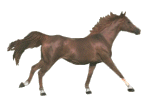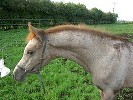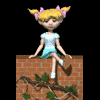| Author |
 Topic Topic  |
|
|
|
Helen Newton
Gold Member
   
 England England
692 Posts |
 Posted - 07 Sep 2008 : 9:10:32 PM Posted - 07 Sep 2008 : 9:10:32 PM




|
|
I am hoping to move my horses to a new home in the next few weeks. There is an area of bracken in the field which has been sprayed leaving the brown dead plants lying on the grass. I believe that green, growing bracken is poisonous, but what about the dead stuff? I've not had any experience of horses having bracken poisoning and have seen horses on rough pasture containing bracken with no obvious ill effects. In the old days dried bracken was used as bedding and of course wild ponies are exposed to bracken on a daily basis. Should I pull up all this dead bracken to be on the safe side? What experience have others had of this common plant?
|
   |
|
Report to moderator
|
|
|
pat ww
Platinum Member
    
United Kingdom
3459 Posts |
 Posted - 07 Sep 2008 : 9:14:33 PM Posted - 07 Sep 2008 : 9:14:33 PM




|
| I think bracken is also linked to cancer, if its not too much trouble I think it is probably better raked up and burned. that way you can spray any new shoots that do appear without the dead stuff getting in the way. |
Report to Moderator  |
|
|
angelarab
Platinum Member
    

Wales
2876 Posts |
|
|
Judith S
Platinum Member
    

Wales
15686 Posts |
 Posted - 08 Sep 2008 : 09:43:22 AM Posted - 08 Sep 2008 : 09:43:22 AM





|
I knew a lady who nearly lost one of her horses with bracken poisoning from eating bracken on their land. The horse recovered & for a couple of years when ever I drove past their property - the bracken area in the fields were fenced off with electric rencing to keep the horses off. The last time I went past the horse were grazing in the fields with free access to the bracken - the owners must have given up keeping them off it!
Where we lived before - the farmers still cut & bale the bracken for bedding - even more so the past couple of years due to the cost of straw. |
    |
Report to Moderator  |
|
|
Helen Newton
Gold Member
   

England
692 Posts |
 Posted - 08 Sep 2008 : 5:01:30 PM Posted - 08 Sep 2008 : 5:01:30 PM




|
Thanks Pat and Judith (and Angel for your offer of help ) I think raking up and burning is going to be the answer. ) I think raking up and burning is going to be the answer. |
   |
Report to Moderator  |
|
|
Zenitha
Gold Member
   

England
1078 Posts |
 Posted - 08 Sep 2008 : 7:36:44 PM Posted - 08 Sep 2008 : 7:36:44 PM




|
Def rake and burn. I've just got rid of loads on our new fields - you have to keep pulling it up cos it just keeps coming back 
It is poisonous, and still palatable when dead. Some horses actually become addicted to it - I believe (sure I read this somewhere) the problem is that it affects the horses' Thiamine levels, and if they eat enough of it , over a long period od time, it can cause irreversable damage, and death.
Also think it is dangerous to humans too (carcinogenic ?) and you should wear gloves when handling it. Orrible pesky stuff.
|
|
Report to Moderator  |
|
|
angel2002
Platinum Member
    

United Kingdom
2502 Posts |
 Posted - 09 Sep 2008 : 12:51:35 PM Posted - 09 Sep 2008 : 12:51:35 PM




|
Just found this bit of info for you -
Bracken - The curling fern that seems to spreading like a bad, green rash across moor and heath at an alarming rate is not only spoiling the countryside, but harbours a tick that passes lyme disease to humans, causes poisoning in cattle, horses, sheep and people and its spores are one of the latest cancer suspects.
This botanical pest is considered something of a delicacy in some parts of the world. The Japanese, for instance, often dine on the young bracken sprouts known as fiddleheads (pictured) and it is considered a treat in some areas of Canada and the US too. The trouble is, bracken, while edible, is also highly toxic - especially the fiddleheads - and has been causing bellyache for farmers for centuries where unwary ruminants might graze on the succulent curling shoots.
Bracken poisoning causes depression of bone-marrow activity which leads to severe leukopenia - a form of white blood cell anaemia, - thrombocytopenia - an abnormally low blood platelet count - and hemorrhagic syndrome. In addition, the uncooked plant contains the enzyme thiaminase, which can destroy thiamine (vitamin B1) and cause a possibly fatal disease similar to beri-beri in non-ruminants such as horses.
Not very pleasant. But, in addition to nasty effects on the blood Pteridium aquilinum was also found - in 1960 - to be highly carcinogenic causing polyp-type bladder and intestinal tumours in grazing animals who ate large amounts of bracken or were fed bracken-containing fodder. The carcinogenicity of bracken was demonstrated definitively using lab rats, a result that was later reproduced by several research groups.
I would burn every bit you pull up and maybe try and find a 'weed-killer' that would permanently get rid of it for you, very nasty stuff.
|
Angel
Passion Arabians
    |
Report to Moderator  |
|
|
gg
Bronze Member
 

England
202 Posts |
 Posted - 09 Sep 2008 : 2:26:39 PM Posted - 09 Sep 2008 : 2:26:39 PM




|
| I know that bracken is poisonious to horses, though when i am out riding with my mare she will always make a b line for it! I have cut and srayed the bit in the field. |
Report to Moderator  |
|
|
Mrs Vlacq
Platinum Member
    

Wales
3776 Posts |
 Posted - 15 Sep 2008 : 10:58:13 AM Posted - 15 Sep 2008 : 10:58:13 AM




|
| Good advice on getting rid of the braken, thought I would mention acorns too. Don't know if you have checked if you have any oak trees but we lost a horse some years back due to these didn't realise he had developed a liking for them. It had been a wet summer then and there was a bumper crop. Now we collect them up or don't use that field in the autumn. |
    
- V Khazad - V Calacirya & V Sulime - Quarida(L) - V Boogie Knights - V Hamra Tofiq |
Report to Moderator  |
|
| |
 Topic Topic  |
|

